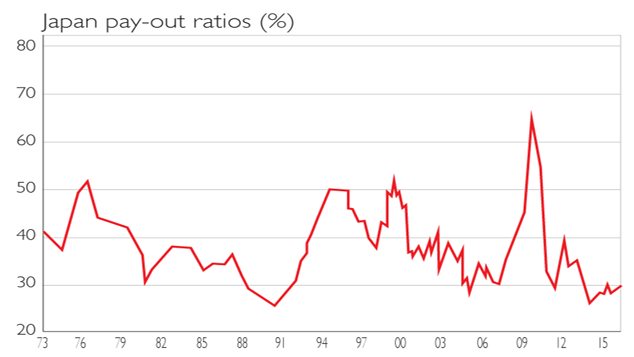
Japanese equities have made a poor start to the year, with the Topix benchmark down by 12% so far. The outcome for many overseas investors hasn’t been quite so bad as this sounds, since the yen is up by 11% against the dollar. Nonetheless, huge amounts of money have flowed out of Japanese equity funds – $100bn in March alone – with foreign investors accounting for around half that.
Despite that, I think the market may prove a good trade for the second half of 2016. Let’s look at a few reasons to be bullish on Japan, at least in the near term.
A stronger outlook
First, there’s the outlook for earnings. There’s growing concern that corporate profits might be running out of steam. And there’s certainly an obvious reason to fear this: China. As the new global economic superpower slows down, Japanese corporations have been badly hit as they are big exporters into the country.
However, I think that China may be past the worst and a recovery may be on the way. Chinese stocks have perked up, which may be signalling that momentum in the economy has turned positive. If so, Japan should benefit.
A second key factor is state intervention. It’s possible that the Bank of Japan can’t do a lot more in terms of monetary experimentation and intervention – it’s pretty much used every available weapon in its armoury. However, the Japanese government could certainly step up to the mark and embark on adding fiscal stimulus (in other words, ramp up state spending).
Crucially, the government may be looking to win a potential snap election in the not too distant future. If so, it’s likely to want to boost the economy. This should help support corporate earnings and benefit stocks.
Then there’s the matter of valuations. These are certainly low by the historical average of the Japanese market, but this average is distorted by the extremely high valuations that the market reached during the bubble years. They are below valuations for the US market, but they don’t appear cheap compared to Europe or emerging markets.
However, Japanese corporations have huge flexibility and firepower to increase dividend payouts, as the chart above from Paul Jackson of Source ETF shows.
Dividends are growing at a double-digit rate, yet the payout ratio (the percentage of cash earnings paid out as dividends) is at historically low levels: the local historical norm is around 37% compared to the current 29%. “This suggests Japanese dividends can continue to grow, even if profits do not,” as Jackson says. Overall, my hunch is that Japan will do better than the fickle investors currently selling stocks expect. So let’s take a look at a few practical suggestions for how to play this.
Three ways to play Japan
First, it may be time to look at the Coupland Cardiff Japan Income and Growth Trust (LSE: CCJI). This fund is currently on a forecast yield of 2.8% and is up 4.8% since the beginning of the year, despite the difficult market conditions. I think this fund, which focuses on larger companies, is the safest way of playing any uptick in Japan. However, more opportunistic and speculative investors might be tempted by Baillie Gifford Shin Nippon (LSE: BGS). This fund mostly invests in faster-growing mid-to-small caps and is up by almost 17% so far this year.
That said, I think that hedging your currency exposure to Japan might make sense over the next few months, since I suspect that the yen might now weaken again (or that at least is what the government would hope to see happen). If so, a good choice might be the Aberdeen Japan Investment Trust (LSE: AJIT), which has hedged around 45% of the value of its portfolio.
This fund has had a miserable start to the year, down by 3.4%. However, it trades on a discount to net asset value (NAV) of almost 13%. In the event that the yen weakens, a hedged fund such as this might come back into favour. In that case, investors might gain from a shrinking discount to NAV as well as the advantage of the currency hedge.